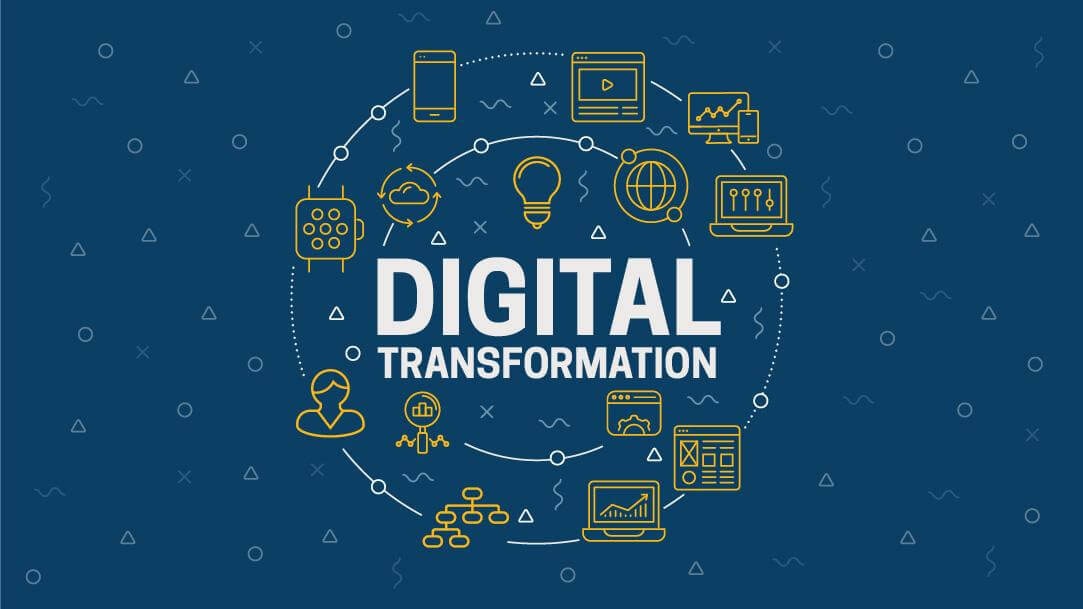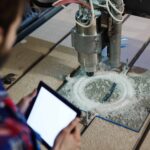Digital transformation challenges appear when your business is its the way to achieving competitive advantage in manufacturing. Traditional business models are facing fierce competition from the more agile and flexible start-ups that use emerging technologies for their manufacturing. From AI-powered robots, 3D printing, to the Internet of Things (IoT)… there are a lot of trends in the world of advanced manufacturing technology and innovation just waiting for manufacturers who want to step up their digital game. Manufacturing digitization can however present some fundamental challenges that can hold manufacturers back from digital transformation initiatives.
If you’re considering this strategy, here are the top 10 digital transformation challenges in manufacturing to know about in order to preemptively plan ways to overcome them:
1. Resistance to change when speaking of digital transformation
Traditionally, each stage of manufacturing operated separately, unaware of the changes happening at other stages. Due to the lack of integration, there were many problems that companies had to deal with, such as heavy inventories, wasted work-hours, and consequently wasted expenses.
Conversely, the emerging technology business model is far more agile and flexible – being able to adapt to changing demands quickly. However, this type of model challenges companies to ensure that the following concepts work:
-
- End-to-end integration of the whole supply chain
- Efficiency and agility at each stage, including suppliers
- Open and speedy communication among organization
These require the whole process on the assembly manufacturing line to adapt to a new way of thinking and a new perspective. Therefore, both labor and middle management lead the resistance against it. They may question if the new way is actually better than the existing business model?

2. The initial investment capital
Small to medium organizations may not have the budgets to invest in new technologies or adapt to existing ones. This can be a barrier when organizations intend to move towards the era of digitalization, but manufacturers must learn to see the bigger picture. There will be upfront investment costs, but think about what the cost of not investing in the technology and keeping up with the global movement will be? A good investment plan is required to help manufacturers know; how much to set aside and when, what improvements to make and how to measure their outcomes.

3. Lack of knowledge and experience about digital transformation
One of the biggest manufacturing digitization challenges is the lack of relevant knowledge in implementing advanced manufacturing technologies in a safe and secure manner. When increasing their advanced technology capabilities in manufacturing, it’s required that manufacturers have to make an effort to learn to use advanced data analytics, AI and machine learning, digital twins, and automation. Otherwise, the lack of knowledge in these, and other areas, can hold back progress. Manufacturing companies may not have their own tech teams to answer all their questions or suggest the most suitable operational plans, so outsourcing can be helpful to reduce the stress of adoption.
External consultants like Kyanon Digital can guide manufacturing companies through investment plans, provide advice and help make the transformation easier.

4. Security concern with digital transformation
As digitalization becomes a global trend and a measurement of growth, more and more equipment is connected through IoT. Human workers are gradually being replaced by robotics and AI and autonomous machines are taking over administrative tasks – often unsupervised. All of this generates a large amount of data, so keeping all data secure – both personal and professional – has been a big challenge and a growing concern for years.
Certainly, employees and management alike are having concerns over the security of personal data within the system. Any violation could potentially lead to substantial losses – or worse, whole business collapses.

5. Rigid Infrastructure
In order to start going digital, manufacturers’ efforts need to be used to overcome existing infrastructures which are rigid and likely incompatible with advanced technology capabilities. Digital transformation requires the organization to transform in every aspect, beginning with training. Training may include:
-
- New robotic operations;
- Flexible production line configurations, or
- Cloud-based resource planning.
6. Employee Errors
Human errors are one of the most common challenges for manufacturing digitization. They affect to the most common risks facing organizations; from safety, and quality, to cybersecurity risks. For example, humans can configure machines incorrectly or insecurely, disclose business sensitive information to outside parties for quoting, mishandle equipment, or open unknown attachments.
Additionally, new processes and operations can potentially increase the risks of human factors. Unfortunately, humans may initially be highly resistant to change and adaption to something new. Therefore, if possible, change should not be imposed. Instead, the rewards of the shift towards digitization should be highlighted thereby empowering employees to create the room they need for adaptation and improvement.

7. Outdated Systems
Technology changes much faster than traditional manufacturing equipment, usually with an estimated lifetime of about 10 years. Therefore, dealing with an outdated infrastructure is far more challenging than dealing with a rigid infrastructure. The older a technology system is, the more difficult it is to make it compatible with a digitized manufacturing environment.
Needless to say, with a modern digital technology environment, appropriate data can be shared between a variety of systems and equipment. However, this might be impossible if business platforms and technologies are over five years old and updating technology can be immeasurably challenging since various interdependencies must be considered.
8. Privacy Concerns
Privacy concerns are also a big challenge in digital transformation, including operational security, personnel security and physical security as data can easily be shared in a fully realized digitized environment. Whenever information is collected to be used to identify a person, it should be considered as a potential privacy concern. This could be just employee or customer contact information, or any kind of data collected by certain IoT sensors, cameras, or biometric authentication devices. It is important to know that while data from one device might not present a privacy concern, that data combined with data from other devices could.

9. A Lack of Organizational Change Management
Rigid organizational structures, inefficient workflows and unsuitable leadership styles can hold back the success of digital transformation. This was never more obvious than in 2020, when companies struggled to quickly adapt to a remote or work-from-home business model.
Simply navigating new technologies and processes is hard enough, but when there is change resistance added to the mix, transformation begins to look next to impossible. Therefore, it is important to note that instead of just focusing on the technical side of digital transformation, you need to consider the humans it directly affects by developing a comprehensive change management plan.

10. Lack of Overall Digitization Strategy
Digital transformation is far more than just the words said about it. The way it has been presented out there lacks any clear definition. This leads companies to a situation in which they are confident they need to be transforming but not quite sure how and where to get started. Therefore, having a strategy in place is a must; without it, your transformation could fail to get off the ground. Before writing down your plan, ask yourself: What are my company’s goals and priorities? Are they consistent across the organization, or are some areas on completely different pages?

11. Conclusion
Each of these 10 digital transformation challenges can be addressed with an implementation plan that works with current processes that stay competitive while enabling future growth opportunities. In order to do so, manufacturers can take theỉ first step towards advanced manufacturing technology integration by reaching out to external consultants experienced in providing guidance and resources.
Contact Kyanon Digital today! We’re ready to help ensure your digital transformation journey goes smoothly.



